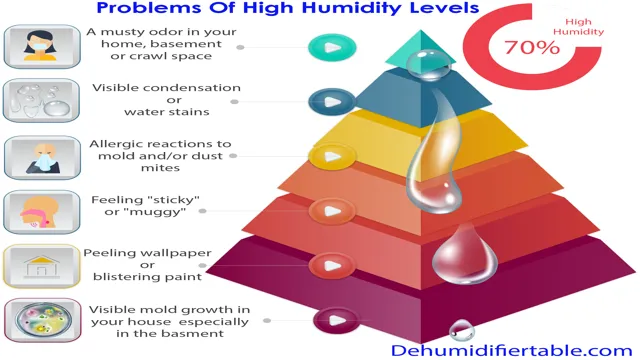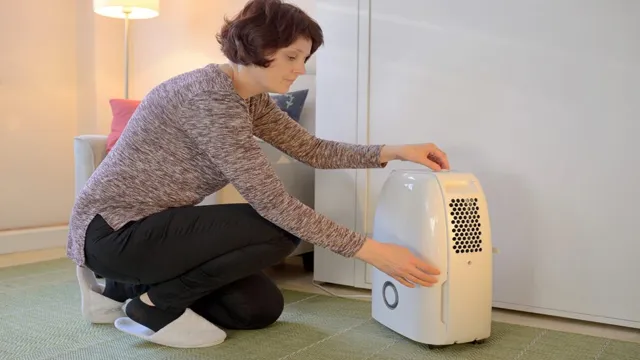Living in Florida can be an amazing experience with its beautiful beaches, warm weather, and plenty of sunshine. However, with that comes high humidity levels, which can make it difficult to stay comfortable inside your home. Humidity levels can be particularly high during the summer months when the temperatures soar.
Not only can high humidity levels make your home feel uncomfortable, but they can also lead to mold growth, musty odors, and even health issues. That’s why it’s important to take steps to reduce the humidity in your Florida home. In this blog post, we’ll share some tips to help you keep the humidity levels under control, no matter the time of year.
Identify Moisture Sources
If you’re wondering how to reduce humidity in your house in Florida, the first step is to identify the moisture sources. Florida’s humid climate means that moisture can come from a variety of sources, including cooking, showering, and even breathing. Additionally, Florida’s proximity to water can also contribute to high indoor humidity levels.
To reduce indoor humidity, make sure your home is properly ventilated and consider using a dehumidifier. Additionally, addressing any known moisture sources such as leaky pipes or fixtures can also help to reduce humidity levels in your home. By staying vigilant and taking proactive steps to address moisture sources, you can keep your Florida home comfortable and healthy.
Air Conditioning Maintenance
Air conditioning maintenance can be an intimidating task for homeowners, but identifying moisture sources is a crucial step in keeping your system running smoothly. Moisture can wreak havoc on your air conditioning unit by causing corrosion, mold growth, and even electrical issues. One common source of moisture is a clogged condensate drain line, which can cause water to back up and overflow into your home.
Be sure to regularly inspect and clean your drain line to prevent this from happening. Additionally, high humidity levels in your home can also contribute to excess moisture in your AC system. Consider investing in a dehumidifier to keep humidity levels under control and reduce strain on your air conditioner.
By taking these steps to identify and eliminate moisture sources, you can extend the life of your air conditioning system and avoid costly repairs.

Proper Ventilation and Airflow
One of the most important factors in proper ventilation and airflow is identifying the sources of moisture in your home. Moisture can cause all sorts of problems, from mold and mildew growth to warped wood and damaged paint. Some common sources of moisture include leaky pipes, damp basements, and poorly ventilated bathrooms and kitchens.
It’s important to not only identify these sources, but also to address them as soon as possible to prevent further damage. This might mean fixing a leaky pipe, installing a dehumidifier in a damp basement, or making sure that your bathroom and kitchen fans are properly vented to the outside. By taking these steps, you can improve the ventilation and airflow in your home, which will not only help prevent moisture problems but can also improve your indoor air quality and overall comfort.
Use Dehumidifiers and Fans
Living in Florida can be a great experience, but the tropical climate can also come with a high level of humidity. If you’re wondering how to reduce humidity in your house in Florida, there are a few methods to consider. Using a dehumidifier is a great way to help remove excess moisture from the air.
This tool works by drawing out moisture from the air and collecting it in a container for you to empty. Another way to reduce humidity is to use fans in your home. Fans can help circulate air and create a more comfortable environment, which can ultimately help reduce humidity.
You can also try opening your doors and windows to let in fresh air, or taking steps to improve ventilation in your home. By following these tips, you can enjoy a more comfortable and less humid environment in your Florida home.
Dehumidifier Placement
Dehumidifier Placement When it comes to keeping your home comfortable and healthy, dehumidifiers and fans can be a great help. High humidity can lead to a whole host of problems, from mold growth to musty odors. That’s why it’s important to place your dehumidifiers strategically throughout your home.
A good rule of thumb is to place one in each room that tends to be particularly humid, such as the bathroom or laundry room. You can also place a dehumidifier in a central location, such as the living room or hallway, to help keep humidity levels consistent throughout your home. Additionally, using fans in conjunction with your dehumidifiers can help to circulate air and create a more comfortable environment.
By strategically placing dehumidifiers and fans throughout your home, you can enjoy a more comfortable and healthy living space.
Ceiling Fan Usage
Ceiling Fan Usage When it comes to keeping your home comfortable, using a ceiling fan is a great choice. Ceiling fans use less energy and are more cost-effective than air conditioning units, making them a more environmentally-friendly choice. Plus, ceiling fans can help keep your air feeling fresh and cool, even on the hottest days.
However, using a ceiling fan alone may not be enough to keep your home feeling comfortable, particularly if you live in a humid climate. One option is to use a dehumidifier to reduce the moisture in the air, which can make it feel cooler and less sticky. Additionally, adding a few portable fans strategically throughout your home can help to improve air circulation, distributing cool air more evenly and making your home feel more comfortable overall.
By combining these solutions, you can keep your home feeling comfortable and cool all year round, without relying solely on air conditioning.
Bathroom and Kitchen Fans
If you want to keep your bathroom and kitchen free from excess moisture and mold, you should invest in dehumidifiers and fans. These appliances work together to keep the air circulating and control humidity levels. Dehumidifiers remove excess moisture from the air, while fans help circulate the air so that it’s evenly distributed throughout the room.
Together, they reduce the chances of mold growth and protect your home’s air quality. By using these appliances regularly, you can ensure that your bathroom and kitchen are dry, comfortable, and free from mold and mildew. So, if you want to keep your home healthy and hygienic, investing in dehumidifiers and fans is a smart choice.
Reduce Indoor Plants
If you’re living in Florida, you know all too well how humid it can get indoors. But did you know that indoor plants could be contributing to the problem? While plants are great for purifying the air and adding some greenery to your home, they also release moisture through a process called transpiration. This can increase the humidity levels in your home, especially if you have a lot of plants.
One way to reduce humidity in your house in Florida is to reduce the number of indoor plants you have or move them outside. Opt for low-moisture plants like succulents, cacti or snake plants if you can’t bear to part with them altogether. Alternatively, you could try using a dehumidifier to help remove excess moisture from the air.
By reducing indoor plants or being mindful of which ones you bring inside, you can minimize humidity levels in your Florida home and improve your indoor air quality.
Moisture Control Plant Options
Moisture control plant options can be a great solution for reducing moisture levels in your home and improving indoor air quality. Indoor plants can help remove excess moisture from the air through a process called transpiration, where they release water vapor into the atmosphere. Some of the best plants for moisture control include spider plants, peace lilies, and Boston ferns.
These plants not only absorb moisture but also filter out harmful toxins, improving the overall air quality of your home. However, it’s important to note that overwatering can lead to mold growth, so be sure to keep your plants properly watered and drained. By incorporating these moisture control plant options into your home, you can reduce moisture levels and make your indoor space healthier and more comfortable.
Plant Care Tips for Humidity Control
Reducing indoor plants can be a great way to regulate humidity and keep your home feeling comfortable. When there are too many plants in one space, they can contribute to excess moisture in the air, leading to problems like mold and mildew. To prevent this from happening, consider limiting the number of plants you keep inside.
If you do have a lot of plants, try grouping them together in one area and using a dehumidifier to remove excess moisture from the air. You can also use a fan to circulate the air and promote better ventilation. By taking these steps, you can ensure that your home remains a healthy and comfortable environment for you and your family.
Remember, a little bit of plant care can go a long way in controlling humidity levels and promoting better overall air quality.
Other Tips for Humidity Reduction
Living in Florida, where the humidity level is typically high, can be a challenge. However, there are several things you can do to reduce humidity in your house and improve your indoor comfort. One simple tip is to increase ventilation by opening windows and using exhaust fans in your bathroom and kitchen.
This helps to circulate dry air into your home and expel dampness and moisture outside. Another way to reduce humidity is to invest in a dehumidifier. A dehumidifier works by removing excess moisture from the air, which can help prevent mold growth, musty odors, and water damage.
It’s also important to check for any leaks or water damage in your home and promptly address them to prevent further moisture intrusion. Additionally, using air conditioning can help to maintain a comfortable indoor temperature while also reducing humidity levels. By implementing these simple tips, you can effectively reduce humidity in your home and create a more comfortable living environment.
Conclusion
In Florida, humidity is as common as sunshine and beaches, but it doesn’t have to be a hindrance to your comfort. With these simple tips, you can reduce the humidity in your house and enjoy a cooler, more comfortable living space. Remember to keep your AC unit maintained, use a dehumidifier, seal off potential leaks and cracks, and incorporate some indoor plants for added air purification.
By implementing these methods, your home will be a humidity-free oasis in the midst of Florida’s tropical climate!”
FAQs
Why does humidity become a problem in Florida houses?
Florida has a hot and humid climate, with high levels of moisture in the air. This makes it difficult for air conditioning units to control the humidity levels indoors, leading to uncomfortable and unhealthy living conditions.
What are some signs of high humidity in a house?
Signs of high humidity in a house in Florida include condensation on windows, musty odors, mold and mildew growth, and the feeling of dampness in the air.
How can I reduce humidity without an air conditioner?
You can reduce humidity in your Florida home by using a dehumidifier, opening windows and doors for ventilation, using exhaust fans in kitchens and bathrooms, and repairing any leaks or water damage.
What temperature should I set my air conditioner to reduce humidity?
To reduce humidity in your Florida house, set your air conditioner to a temperature between 70 and 75 degrees Fahrenheit. This will help maintain a comfortable indoor environment while also reducing excess moisture.
What are some natural ways to reduce humidity in my home?
You can reduce humidity naturally in your Florida home by using houseplants, such as bamboo or peace lilies, which absorb moisture from the air. You can also use moisture-absorbing materials like silica gel or activated charcoal, and reduce water usage by fixing leaks and taking shorter showers.

